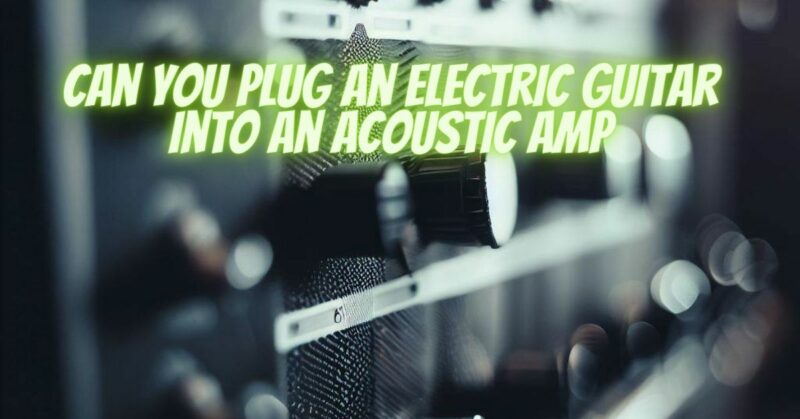The world of guitar amplification is diverse, with different types of amplifiers tailored for specific instruments and genres. A common question that arises among guitarists is whether it’s possible to plug an electric guitar into an acoustic amplifier. In this article, we’ll explore the compatibility, considerations, and potential advantages or limitations of connecting an electric guitar to an acoustic amp.
- Understanding Electric and Acoustic Amplifiers:
Electric Guitar Amps: Designed specifically for electric guitars, these amplifiers are engineered to color the sound, add gain, and provide tonal shaping options. Electric guitar amps often include features such as distortion, reverb, and equalization controls to shape the amplified sound according to the player’s preferences.
Acoustic Guitar Amps: Acoustic guitar amplifiers are crafted to faithfully reproduce the natural, uncolored sound of acoustic instruments. They typically include inputs for both acoustic-electric guitars and microphones, offering a clean and transparent amplification that preserves the nuances of the instrument’s tone.
- Compatibility:
a. Electric Guitar into Acoustic Amp: In most cases, plugging an electric guitar into an acoustic amplifier is entirely feasible. The amplifier should have a standard 1/4-inch input jack, which is the same type used by electric guitars. However, the tonal characteristics may differ from those obtained when using an electric guitar amp.
b. Consideration for Acoustic-Electric Guitars: Many modern acoustic-electric guitars come equipped with built-in pickups, allowing them to be plugged directly into electric guitar amplifiers or acoustic amps. This versatility caters to players who wish to transition seamlessly between amplified acoustic and electric sounds.
- Tonal Considerations:
a. Acoustic Amps and Clean Tones: Acoustic amplifiers are renowned for their clean and transparent sound reproduction. Plugging an electric guitar into an acoustic amp can result in a crisp and clear tone, ideal for genres that demand a pristine sound, such as jazz or certain clean passages in various styles.
b. Lack of Distortion and Effects: One crucial distinction is that acoustic amplifiers typically lack the distortion and effects commonly found in electric guitar amps. If a guitarist desires the classic overdriven tones or a variety of built-in effects, using an electric guitar amp would be more appropriate.
- Advantages of Plugging an Electric Guitar into an Acoustic Amp:
a. Clarity and Transparency: Acoustic amplifiers excel at providing a clean and transparent reproduction of the instrument’s natural sound. This clarity can be advantageous for intricate picking, fingerstyle playing, or genres that emphasize a pristine sonic character.
b. Versatility for Acoustic-Electric Guitars: For those with acoustic-electric guitars, plugging into an acoustic amp offers a convenient way to amplify both acoustic and electric sounds without needing to switch amplifiers.
c. Portability and Convenience: Acoustic amps are often designed with portability in mind, making them a practical choice for small gigs, rehearsals, or situations where a more straightforward amplification setup is preferred.
- Limitations:
a. Lack of Electric Guitar Tonal Options: Acoustic amps may lack the tonal options, distortion, and effects found in electric guitar amps. Players who require a broad range of sonic possibilities may find the limitations restrictive.
b. Not Ideal for Heavy Distortion: If a guitarist plays genres that heavily rely on distorted tones, such as rock or metal, an acoustic amp may not provide the saturated and crunchy sounds associated with electric guitar amps.
c. Feedback Issues: Acoustic amps are designed to handle the feedback tendencies of acoustic instruments. Plugging a high-gain electric guitar into an acoustic amp may result in feedback issues, especially at higher volumes.
In summary, plugging an electric guitar into an acoustic amp is possible and can yield interesting tonal results, especially if clarity and transparency are desired. Acoustic amps offer a clean canvas for the electric guitar’s sound, making them suitable for certain playing styles and genres. However, it’s essential to consider the limitations, such as the lack of built-in effects and distortion, which may impact the suitability for certain musical contexts. Ultimately, the choice depends on the guitarist’s preferences, playing style, and the sonic characteristics sought for a particular performance or recording.


